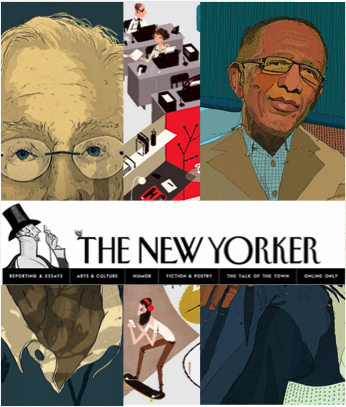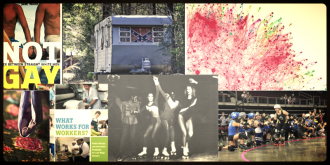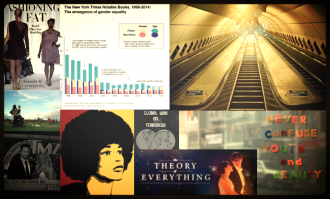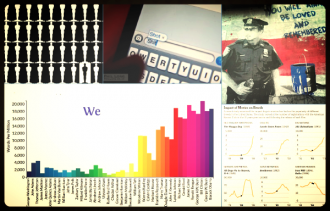
When the news came from Ferguson on November 24th, it was hard to know what to do. Every sociologist and criminologist possesses some pertinent expertise, whether we study violence, law, race, or criminal justice and injustice. But how and when should we engage? The streets were alive with protesters, police officers, and journalists. The President was calling for calm, which was itself a polarizing message. And Facebook feeds flowed with horrifying videos, rage, and invective, as many were “defriending” and “unfollowing” one another until their social networks were fully purged or converted.
Public scholars can and should step up in such highly-charged political moments, but there was little room to maneuver in those first few days. A dispassionate rendering of cold social facts – on the legal intricacies of grand jury indictment, for example – would ring hollow to those who saw the events in clear moral terms. A straightforward presentation of a pertinent research study – on the effectiveness of police body cameras, for example – would redirect energy and attention away from larger questions. And, to the extent we could actually penetrate the teeming information space, our statements would be reduced to 140-character factoids and channeled to those predisposed to agree with us already. How can we do good public work under such conditions?
In the tense days and nights after the indictment announcements, sociologists such as Michael Eric Dyson and Doug Hartmann made insightful big-picture contributions. Some of us wrote op-eds or gave interviews, others spoke at demonstrations or held teach-ins, and many more revamped our regular teaching and research activities. Like many of you, I found myself in several community forums, most recently with a sitting judge and a television reporter who would moderate our discussion. The talk had been scheduled for months as a wonky “nuts and bolts of justice reform” discussion, but the sudden surge of interest in crime and punishment reshaped our agenda. It would have been foolish, if not impossible, to ignore the protests and issues occurring right outside the door. Interest was high. We moved the event to a larger hall when we reached capacity and we recorded the proceedings for later broadcast. As I looked around the racially and socially diverse crowd of journalists, students, lawyers, teachers, police officers, formerly incarcerated people, and community members, I knew that dozens if not hundreds of my colleagues were similarly engaged in their communities. I claim no special expertise on these topics or events, but I share these personal reflections and suggestions in hopes of encouraging other section members who might wish to engage the public.
Position and Language
When speaking with a public audience, I try to remember that there are other experts in the room. For example, a middle-aged white guy like me has little authority or legitimacy regarding the subjective experience of interacting with police as a young African American in the central city. Put simply, many in attendance did not want or need me to lecture to them about how their communities are policed. So my job was to give due attention to race and justice while also acknowledging the real limits of my perspective and the research evidence I would cite. Thinking a personal story might help, I opened by acknowledging the #BlackLivesMatter and #CrimingWhileWhite campaigns and briefly noting my own juvenile arrests – and how the “judicious and humane discretion” of three Minnesota police officers was so important in my life that I thanked them by name in my dissertation acknowledgements. After repeated exposure to the Michael Brown and Eric Garner videos, few in the audience would have argued that men of color have been getting the same breaks that I received. As importantly, few would have argued against providing the same sort of breaks to all young people. Yet framing the issue in this way also helped make such points without bashing or demonizing those police officers – several of them my former students — who showed up at the forum.
This was not the night for a PowerPoint presentation, as personal stories are often more effective than statistics in helping audiences evaluate and reframe their image of crime and justice. I also called out Emily Baxter’s WeAreAllCriminals.com. Using evocative images and personal accounts, WAAC shows the blurriness of the criminal/non-criminal distinction. Terminology plays a similar role in public scholarship, where the wrong descriptor can quickly alienate half the audience. I try to use simple, neutral language to facilitate discussion, addressing people formally (e.g., as Ms. Johnson or Judge Castro, rather than as Angie or Lenny). In such forums, identifiers such as “police officer” or “formerly incarcerated” are more helpful and precise than terms like “cop” and “offender.”
Content and Context
Academics sometimes try to teach a whole semester’s worth of material in an hour, which dramatically exceeds anyone’s ability to process new information. I try to identify three to five key points and to make sure that they are well-supported in the literature. That is, that they are “near-consensus” areas in our field that the public might not yet appreciate. That night, I called out: (1) Tom Tyler’s work on procedural justice, and how treating people with dignity and respect engenders greater trust and legitimacy, regardless of the outcome of a citizen’s encounter with the criminal justice system; (2) social-psychological research on implicit bias, which shows that the great majority of Americans, including police officers and professors, hold unconscious group-based biases that affect our behavior; (3) a few well-chosen statistics on the basic race-specific rates of arrest and incarceration in our community; and, (4) the proportion of these arrests that are for low-level offenses that rarely result in prosecution or conviction. Local evidence is critical because the audience is far more engaged in practices close to home (and more likely to dismiss or discount bad things that happen elsewhere). Public criminology can also provide an important myth-busting function in such cases. For me, this meant calling out states like Minnesota and Wisconsin for having the nation’s worst racial disparities in correctional populations – a difficult but essential truth for the audience to grasp. Context is also important for drawing local, national, and international comparisons. For example, I explained how my home state was admirably stingy with prison beds, but profligate in putting people on very long probation terms.
Hope and Questions
Public events, to a far greater extent than academic talks, should leave the audience with a sense of efficacy, or at least hope for real change. I made sure to note that after four decades of rising incarceration, that criminal punishment had finally begun a modest decline. And, of course, that our community and the nation had enjoyed a 50 percent crime drop over the past two decades. To put this drop in perspective, I explained how this meant a decline from 100 Minneapolis murders in 1995 to about 40 the past few years. Nationally, I pointed to bipartisan reform efforts such as the REDEEM Act, cosponsored by Senators Corey Booker and Rand Paul. Locally, I identified bipartisan reforms such as the new Minnesota expungement law and a new ban-the-box provision that bars organizations from asking about criminal records on job applications, but permits them to inquire at the interview stage. I also tackled issues in my own area of research expertise, including local challenges to felon disenfranchisement and the broader problem of “piling on” so many collateral sanctions that they become criminogenic. In particular, I described recent testimony on behalf of six “model probationers,” who were hauled into court and charged with new felonies because they had voted while still “on paper.” A broad coalition was assembling to challenge the voting ban (including the district attorney charged who prosecuted those cases) and several audience members approached me after the event to ask how they could get involved. Finally, I spoke about the costs of diminished trust in the criminal justice system, including Todd Clear and Natasha Frost’s argument that the discretion to make back-end sentencing adjustments can help curb excess or gratuitous punishment – even, or especially, for those serving long sentences for violent crimes.
Public events work best when audience members have a chance to engage the speakers, and we received an impressive range of audience questions that evening. When asked about the prospects for a new social movement around criminal justice reform, I could applaud the efforts of students — and the members of this section — to shine a brighter light on crime, law, and justice in the contemporary United States. As a medical school colleague is fond of saying, sunshine can be a marvelous disinfectant. So too can public criminology.
For further reading, see Doug Hartmann’s Ferguson, the Morning After; Insights on Crime and Punishment from a Judge and a Sociologist, and Public Criminologies (with Michelle Inderbitzin).
Reprinted from Crime, Law & Deviance News, FALL/WINTER 2014 -2015.
Newsletter for the Crime, Law & Deviance section of the American Sociological Association






